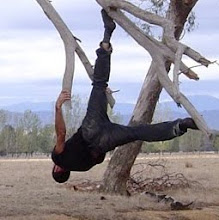
I borrowed Meg's bike, which has a handy detachable front basket, and trawled the town for street fruit. I asked the local librarian, Janet, if I could harvest the rhubarb from the small community garden at the back of the library and she happily agreed, and I found some feral apples and pears ripe and delicious. I also noted other varieties of apples, nectarines and pears that would be ripe over the next few weeks and noted that many of the feral trees which had a substantial build up of humus at their base had disease-free apples. I cooked all the fruit together and added local honey.

I then peddled to O's to exchange some of our old glass jars for his larger, uniformed, black-lidded ones. I stayed for lunch, talked about brewing beer and gathered more apples and a branch of red-flowering eucalypt for my gal on the way home.

These small bottled gifts are for the organisers of the event – friends – folk who have worked hard over the past few weeks to organise the forthcoming day. As a child my folks had a successful cottage industry manufacturing jellies, mustards, chutneys and jams and this week I felt the spirit of that familial activity return.












